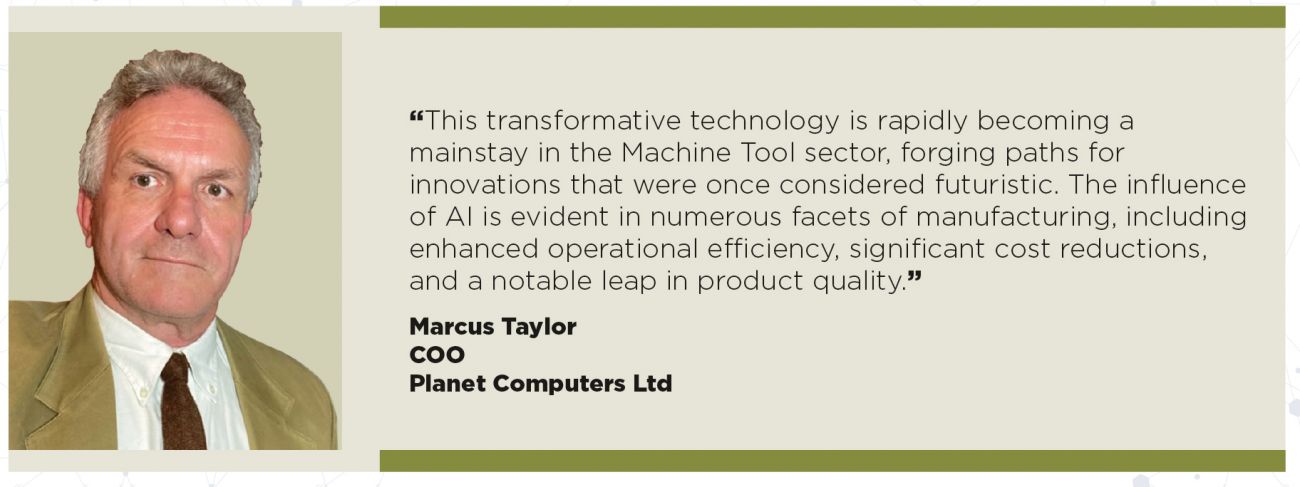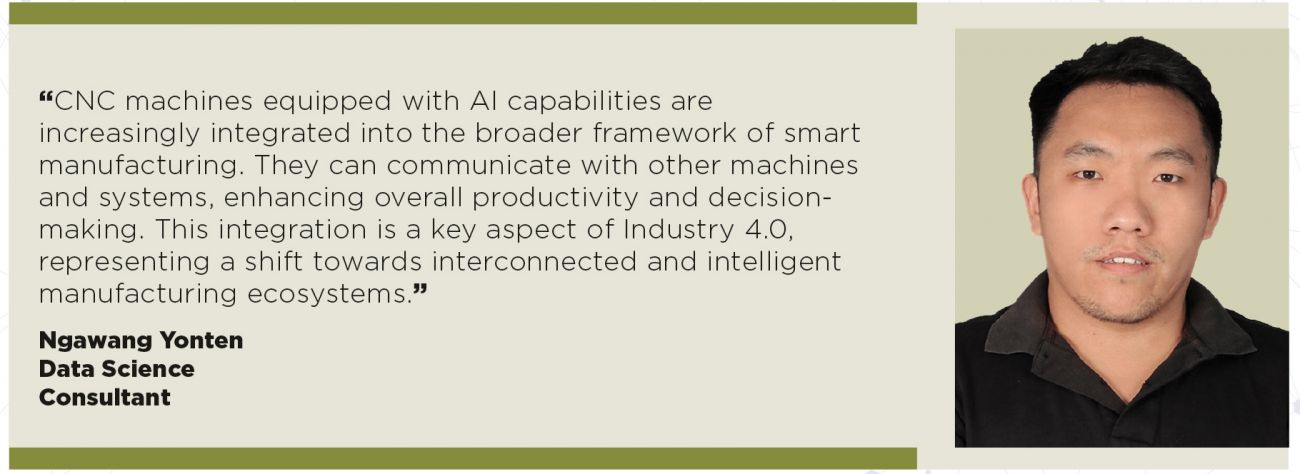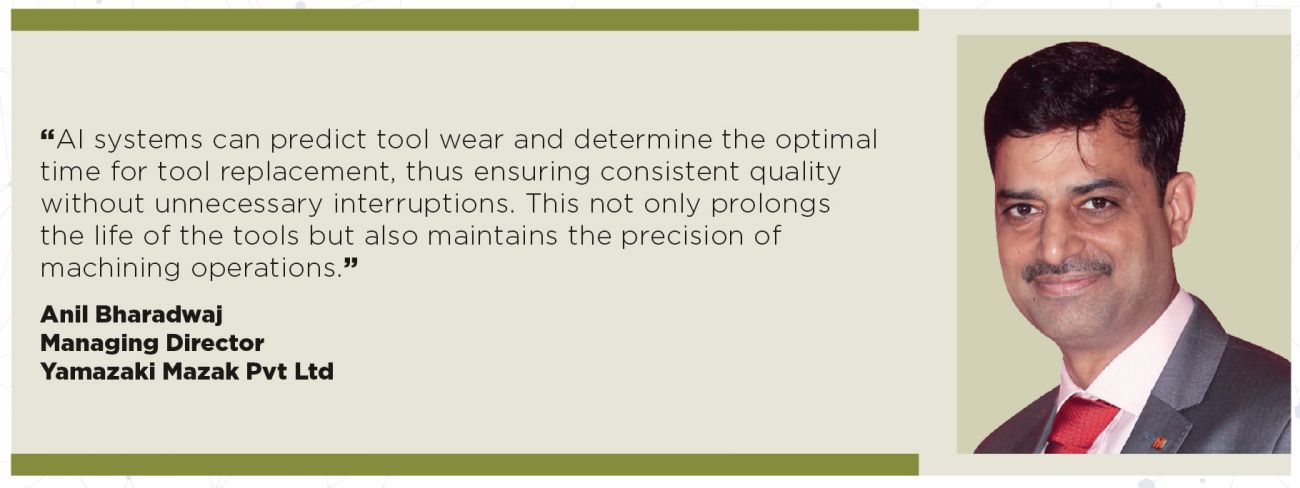AI IN THE MACHINE TOOL INDUSTRY

The Machine Tool industry, a pivotal player in global manufacturing, stands on the brink of a revolutionary transformation driven by Artificial Intelligence (AI). This integration marks a significant departure from traditional manufacturing practices, heralding an era of smart manufacturing that surpasses the realms of mere automation.
Artificial Intelligence (AI) in this context is not just an add-on technology but a fundamental pillar reshaping the industry’s future. Its role extends well beyond automating repetitive tasks, encompassing a range of functionalities from predictive maintenance to real-time decision-making, all geared towards unprecedented precision and efficiency.
Marcus Taylor, COO, Planet Computers Ltd, says, “This transformative technology is rapidly becoming a mainstay in the Machine Tool sector, forging paths for innovations that were once considered futuristic. The influence of AI is evident in numerous facets of manufacturing, including enhanced operational efficiency, significant cost reductions, and a notable leap in product quality. As we delve deeper into the current state of AI in machine tooling, it becomes clear that this technology is not a fleeting trend but a cornerstone of modern and future manufacturing landscapes. Our new range of XR AI 5G computers and sensors are now being applied to CNC machines at the Institute of Technical Education for Human Centric AI, Singapore, to enhance training and improve productivity.”

|
AI also plays a crucial role in optimizing machining processes. By analyzing parameters such as cutting speed, feed rate, and tool path, AI algorithms can determine the most efficient machining strategies. This leads to improvements in efficiency, reduced material waste, and superior product quality. |
Key applications of AI in machine tooling
The integration of AI into machine tooling has brought about a renaissance in machining processes, redefining efficiency and precision. AI is making a significant impact on various areas:
- Predictive Maintenance: At the forefront of AI applications in machine tooling is predictive maintenance. AI algorithms analyze data from sensors on CNC machines to predict when parts might fail or require maintenance. Taylor says, “This proactive approach significantly reduces downtime and maintenance costs, as issues can be addressed before they result in machine failure. For example, AI systems can monitor vibration, temperature, and sound patterns to predict spindle failures, one of the most costly and common issues in CNC machining.”
- Process Optimization: AI also plays a crucial role in optimizing machining processes. By analyzing parameters such as cutting speed, feed rate, and tool path, AI algorithms can determine the most efficient machining strategies. This leads to improvements in efficiency, reduced material waste, and superior product quality. Moreover, AI-driven process optimization helps in adapting to different materials and machining conditions, enhancing the machine’s versatility and productivity.
Anil Bharadwaj, Managing Director, Yamazaki Mazak Pvt Ltd, says, “Mazak’s Smooth AI Spindle utilizes AI technology to optimize cutting conditions by monitoring spindle vibration and adaptively altering cutting Feeds & Speeds to remove the vibration. With optimum processes achieved, the cutting technology characteristics for the tool are stored in the MAZATROL or EIA NC program. Mazak’s AI Thermal Shield also automatically compensates the machine for temperature changes.Machine learning combined with Spatiotemporal modeling is used to increase the stability of processes with temperature change, further enhancing the machine’s accuracy.”
- Quality Control: Taylor says, “Machine learning models are increasingly used for real-time quality control during the machining process. These models can detect anomalies or deviations from the expected outcome, significantly reducing the rate of defective products. By continually learning from new data, these systems become more adept at identifying and rectifying quality issues, ensuring consistently high standards.”
- Tool Life Management: Another critical application of AI in machine tooling is in tool life management. Bharadwaj says, “AI systems can predict tool wear and determine the optimal time for tool replacement, thus ensuring consistent quality without unnecessary interruptions. This not only prolongs the life of the tools but also maintains the precision of machining operations.”
- Energy Efficiency: AI applications extend to optimizing the energy consumption of CNC machines. Taylor says, “Through intelligent analysis and adjustments, AI-driven systems can reduce power usage, leading to more environmentally friendly operations and cost savings. This is particularly crucial in large-scale industrial settings where energy costs constitute a significant portion of operational expenses.”

|
AI enables machines to adapt to varying material properties or unexpected conditions during the machining process. This adaptability improves the flexibility and efficiency of CNC machines. |
- Adaptive Machining: AI enables machines to adapt to varying material properties or unexpected conditions during the machining process. This adaptability improves the flexibility and efficiency of CNC machines, allowing for more complex and varied machining tasks to be performed with high precision.
- Machine Learning for CNC Programming: Advanced AI algorithms are increasingly used to assist in generating or optimizing CNC programs. By analyzing design models and specific machine capabilities, AI can recommend the most efficient programming strategies, significantly reducing programming time and enhancing machine utilization.
- Integration with IoT and Industry 4.0: Ngawang Yonten, Data Science, Consultant, who was part of the team that developed the award-winning Industry 4.0 solution Smartfix says, “CNC machines equipped with AI capabilities are increasingly integrated into the broader framework of smart manufacturing. They can communicate with other machines and systems, enhancing overall productivity and decision-making. This integration is a key aspect of Industry 4.0, representing a shift towards interconnected and intelligent manufacturing ecosystems.”
- Human-Machine Interaction: AI has significantly enhanced the interaction between CNC machines and operators. Intelligent interfaces and decision-support systems make it easier for operators to manage complex tasks and make informed decisions, thereby increasing productivity and reducing the likelihood of errors. Taylor says, “These applications of AI in machine tools represent a significant leap forward in manufacturing technology. They not only improve efficiency and quality but also open up new possibilities in terms of what can be achieved with CNC machining. As AI technology continues to evolve, we can expect these applications to become more sophisticated, further revolutionizing the machine tool industry.”
The future of AI in machine tools
The trajectory of AI in the Machine Tool industry points towards a future where manufacturing is not only smarter but also more interconnected and intuitive. The potential advancements in AI promise to further revolutionize this sector, driving innovation in machine tool design, operation, and maintenance.
Real-Time Adaptive Control: “One of the most exciting prospects is the development of real-time adaptive control systems. These systems will enable CNC machines to make instant adjustments during the machining process, accommodating for variations in material properties, tool wear, and external conditions. This will not only improve machining accuracy but also enhance the flexibility of manufacturing processes, allowing for more complex and customized production runs,” says Taylor.

Intelligent Optimization of Production Processes: Yonten says, “AI is set to play a pivotal role in the holistic optimization of production processes. By analyzing data across the entire manufacturing chain, AI systems can identify bottlenecks, predict issues before they arise, and suggest improvements. This level of intelligence will lead to significant gains in efficiency, productivity, and cost-effectiveness.”
Enhanced Human-Machine Collaboration: The future also holds promise for enhanced human-machine collaboration. Taylor says, "With the advancement of AI, we can expect more intuitive interfaces and decision-support tools that make it easier for operators to interact with CNC machines. This will not only improve the user experience but also enable operators to leverage AI capabilities more effectively, leading to better outcomes.”

|
As AI technologies continue to mature, we will see systems that are capable of learning and evolving over time. These self-improving systems will be able to adapt to new challenges and continuously optimize their performance. |
Learning and Evolving Systems: As AI technologies continue to mature, we will see systems that are capable of learning and evolving over time. These self-improving systems will be able to adapt to new challenges and continuously optimize their performance, ensuring that manufacturing processes remain at the cutting edge.
Integration with Emerging Technologies: Taylor says, “The integration of AI with other emerging technologies such as the Internet of Things (IoT), advanced robotics, and augmented reality will create even more opportunities for innovation. This convergence will lead to the creation of highly sophisticated manufacturing ecosystems that are responsive, efficient, and adaptable.”
The future of AI in the Machine Tool industry is not just an extension of current trends but a leap into a new era of manufacturing intelligence. With AI at the helm, the Machine Tool industry is poised to redefine what is possible in terms of efficiency, precision, and innovation.
|
Tech Talks is a column by industry veteran and journalist Reji Varghese that talks about the latest advancements in Machine Tools, provides snippets from history, interesting facts, etc. about the Machine Tool industry. |
 |
Reji Varghese MD RV Forms & Gears |




 Facebook
Facebook.png) Twitter
Twitter Linkedin
Linkedin Subscribe
Subscribe